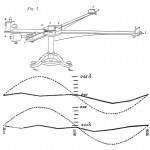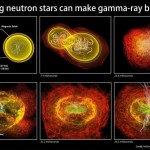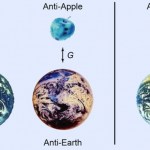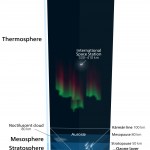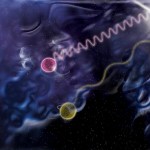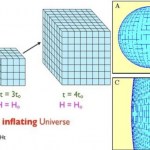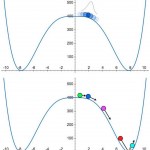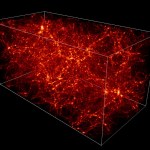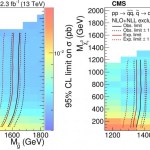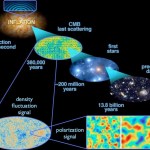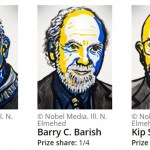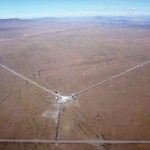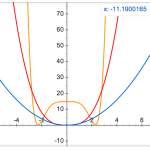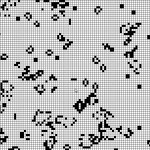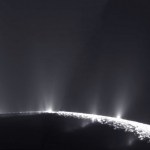Physics
“On what can we now place our hopes of solving the many riddles which still exist as to the origin and composition of cosmic rays?” –Victor Francis Hess
It’s often said that advanced in physics aren’t met with “eureka!” but rather with “that’s funny,” but the truth is even stranger sometimes. Rather than the scientific method of: hypothesis, method, experiment, results, conclusion, revise, repeat, etc., many times throughout history, it’s been a series of surprise observations that have often led to our greatest leaps forward. When the speed of light was discovered not to differ…
"I was born not knowing and have had only a little time to change that here and there." -Richard Feynman
Scientists have long had a reputation for being uptight, serious, and even killjoy personalities. But 50+ years ago, Richard Feynman was forcing everyone who felt that way to challenge their assumptions. With his brash attitude and fun-seeking personality, Feynman seemingly was most at home when he was at his most outrageous.
Feynman at the Myths and Legends Party dressed as “God.” His wife, Gweneth, is dressed as Medusa, with a rock as her date. Image credit: from Christopher Sykes, No…
"O. Hahn and F. Strassmann have discovered a new type of nuclear reaction, the splitting into two smaller nuclei of the nuclei of uranium and thorium under neutron bombardment. Thus they demonstrated the production of nuclei of barium, lanthanum, strontium, yttrium, and, more recently, of xenon and caesium. It can be shown by simple considerations that this type of nuclear reaction may be described in an essentially classical way like the fission of a liquid drop, and that the fission products must fly apart with kinetic energies of the order of hundred million electron-volts each." -Lise…
"Designing a station with artificial gravity would undoubtedly be a daunting task. Space agencies would have to re-examine many reliable technologies under the light of the new forces these tools would have to endure. Space flight would have to take several steps back before moving forward again." -Andy Weir
Ever wonder, in those science fiction shows, how space travelers always stay “down” on their starship? Irrespective of acceleration, and despite the fact that the astronauts we have in orbit around Earth are weightless, they’re always depicted as having a floor and a ceiling that are…
"When we meet real tragedy in life, we can react in two ways - either by losing hope and falling into self-destructive habits, or by using the challenge to find our inner strength." -Dalai Lama
Orbiting at hundreds of miles above Earth’s atmosphere, you’d think the Hubble Space Telescope would be safe and stable for a long time. But despite our definitions, Earth’s atmosphere doesn’t “end” and space doesn’t “begin” when we get 60 miles (100 kilometers) up. Instead, Earth’s atmosphere continues, albeit tenuously, for incredible distances, until it eventually merges with the solar wind. It’s…
"This is going to have a bigger impact on science and human understanding, in many ways, than the first discovery of gravitational waves. We're going to be puzzling over the observations we've made with gravitational waves and with light for years to come." -Duncan Brown
Detecting black holes and the gravitational wave signals from them was an incredible feat, but doing the same thing for neutron star mergers is a true game-changer. Instead of fractions of a second, neutron star mergers show up for up to half a minute. Unlike black holes, there’s an electromagnetic counterpart. Because of…
"It’s becoming clear that in a sense the cosmos provides the only laboratory where sufficiently extreme conditions are ever achieved to test new ideas on particle physics. The energies in the Big Bang were far higher than we can ever achieve on Earth. So by looking at evidence for the Big Bang, and by studying things like neutron stars, we are in effect learning something about fundamental physics." -Martin Rees
When the Advanced LIGO detectors turned on in 2015, it shook up the world when they detected their first event: the merger of two quite massive black holes. Since that time, they’ve…
“If the doors of perception were cleansed every thing would appear to man as it is, Infinite. For man has closed himself up, till he sees all things thro' narrow chinks of his cavern.” -William Blake
When it comes to the ultimate question of the size of the Universe, we have to look to greater scales than what we can possibly observe. Although we can place constraints on how big the unobservable Universe must be, coming up with a lower limit to its overall size, there’s a bigger question that we don’t yet know the answer to: is it finite in size, or is it truly infinite?
The observable…
"It’s hard to build models of inflation that don't lead to a multiverse. It’s not impossible, so I think there’s still certainly research that needs to be done. But most models of inflation do lead to a multiverse, and evidence for inflation will be pushing us in the direction of taking [it] seriously." -Alan Guth
It sounds like an unprovable fantasy: the idea that our Universe is just one of countless others, dotted across an eternally expanding empty space separating them. That’s generally how we picture the Multiverse, with each Universe having its own hot Big Bang distinct from every…
“Right is right even if no one is doing it; wrong is wrong even if everyone is doing it.” -Augustine of Hippo
Science isn't the easiest endeavor you can undertake. Sure, the rewards are tremendous: you can wind up understanding any phenomenon in the Universe as well (or better) than any human has ever understood it before. But on your way there, you're going to have to do some of the most difficult work you've ever done. It isn't just mathematical and scientific work, either, but internal work on your own psyche. You'll need to learn how to be wrong.
From the distant Universe, light has…
"There are stars leaving the Milky Way, and immense gas clouds falling into it. There are turbulent plasmas writhing with X- and gamma-rays and mighty stellar explosions. There are, perhaps, places which are outside our universe. The universe is vast and awesome, and for the first time we are becoming a part of it." -Carl Sagan
It’s no secret that if we look at the matter we see in the Universe, the story doesn’t add up. On all scales, from individual galaxies to pairs, groups and clusters of galaxies, all the way up to the large-scale structure of the Universe, the matter we see is…
“Some people believe holding on and hanging in there are signs of great strength. However, there are times when it takes much more strength to know when to let go and then do it.” -Ann Landers
The history of physics is littered with brilliant ideas that have revolutionized how we look at the Universe... and have been discarded entirely because they’ve failed to describe reality. Theories like the Tired-Light alternative to relativity, the Steady-State alternative to the Big Bang, and even the Sakata Model alternative to the quark model of particles have come and gone, with practically no one…
"There's no obvious reason to assume that the very same rare properties that allow for our existence would also provide the best overall setting to make discoveries about the world around us. We don't think this is merely coincidental." -Guillermo Gonzalez
Beginning in 1979, a new idea arose in theoretical physics, seeking to improve upon the idea of the Big Bang: cosmic inflation. Recently, a number of physicists, including one of inflation’s cofounders, Paul Steinhardt, have come out with vitriol against the theory of inflation, calling it not even science. It’s true that inflation may not…
“Something is happening here and this is going to have an impact.” -Robert Dijkgraaf, on Verlinde's work
There are many attempts out there to reconcile the quantum field theories that describe the electromagnetic and nuclear forces with general relativity, which describes the gravitational force. Certain questions, about gravitational properties in strong fields and on small scales, will never be answered otherwise. In order to make that happen, we'd need a quantum theory of gravity. While string theory is the most popular idea, there are others, such as asymptotic safety, loop quantum…
"Wormholes are a gravitational phenomena. Or imaginary gravitational phenomena, as the case may be." -Jonathan Nolan
Yes, we detected gravitational waves, directly, for the first time! Just days after Advanced LIGO first turned on, a signal of a 36 solar mass black hole merging with a 29 solar mass black hole gave us our first robust, direct detection of these long-sought waves, changing astronomy forever. Einstein’s General Relativity was validated in a whole new way, and over 40 years of work on developing and building LIGO was vindicated at last.
The inspiral and merger of the first pair…
"Well, I walked into Building 20 and looked in at the various little labs. There was a bunch of people doing something that looked to me to be sort of interesting, and since I knew all this electronics, I asked them, “Look, can you use a guy?” And I sold myself off as a technician for about two years." -Rai Weiss, on the start of his physics career at MIT
It’s official at long last: the 2017 Nobel Prize in Physics has been awarded to three individuals most responsible for the development and eventual direct detection of gravitational waves. Congratulations to Rainer Weiss, Kip Thorne, and…
"If I die trying but I’m inadequate to the task to make a course change in the evolution of this planet…okay I tried. The fact is I tried. How many people are not trying. If you knew that every breath you took could save hundreds of lives into the future had you walked down this path of knowledge, would you run down this path of knowledge as fast as you could." -Paul Stamets
When you look at the dark matter network of the Universe, what do you see? Do you see patterns similar to other networks, like neurons in your brain or the mycological mats found beneath the soil on Earth? Of course you…
"I know of no other scientist, no other theoretical physicist alive who has a clearer focus on whether our theories and ideas are relevant to the real world. And that's always what he's after." -Neil Turok, on Paul Steinhardt
The inflationary Universe is one of the most revolutionary new ways of looking at the cosmos to come out of the last 40 years of science. Instead of going all the way back to a singularity from which time, space, matter, and energy all emerged, cosmic inflation posits a different state that gave rise to our hot, dense, matter-and-radiation-filled Universe. With energy…
“It's always seemed like a big mystery how nature, seemingly so effortlessly, manages to produce so much that seems to us so complex. Well, I think we found its secret. It's just sampling what's out there in the computational universe.” -Stephen Wolfram
In the mid-20th century, computers allowed us to explore a brand new idea: that a discrete space, with a simple set of rules and straightforward initial conditions, could evolve in steps to create a rich, life-like environment. While many of us have played or seen simulations of Conway’s Game of Life, a deeper idea is at the core of such a…
"Day after day, day after day,
We stuck, nor breath nor motion;
As idle as a painted ship
Upon a painted ocean.
Water, water, every where,
And all the boards did shrink;
Water, water, every where,
Nor any drop to drink."
- Samuel Taylor Coleridge
Here on Earth, water can easily exist in all three phases of matter: solid, liquid, and gas. The reason for this is simple: Earth has the right range of temperatures and pressures to experience not just the common solid and gas phases, but the liquid water phase, too. In the outer Solar System, worlds like Europa, Enceladus, and Pluto are too far…
